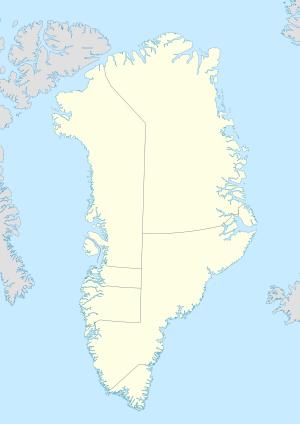Igaliku
|
Igaliku Garðar, Igaliko |
|
|---|---|

Illerfissalik seen from Igaliku
|
|
| Location within Greenland | |
| Coordinates: 60°59′16″N 45°25′15″W / 60.98778°N 45.42083°WCoordinates: 60°59′16″N 45°25′15″W / 60.98778°N 45.42083°W | |
| State |
|
| Constituent country |
|
| Municipality |
|
| Founded | 1783 |
| Government | |
| • Mayor | Klaus Egede |
| Population (2010) | |
| • Total | 55 |
| Time zone | UTC-03 |
| Postal code | 3921 Narsaq |
Igaliku (IATA: QFX) is a settlement in the Kujalleq municipality in southern Greenland. The town was founded as Igaliko in 1783 by the trader and colonial administrator Anders Olsen and his wife Tuperna, who was a Greenlander. In 2010, Igaliku had 55 inhabitants.
Igaliku is located southeast of Narsarsuaq, on a peninsula jutting off the mainland of Greenland near the eastern shore of upper Tunulliarfik Fjord. Access to Igaliku from Narsarsauq is cheaper and easier by landing at the small harbor of Itilleq and then crossing the isthmus 4 km (2.5 mi).
Igaliku is best known for the ruins of Garðar, once the religious heart of 12th-century Norse Greenland. The area was at the very heart of the Eastern Settlement and has been extensively archaeologically excavated since the 1830s. There are several historical graves in the area, although most have not presently been identified. The nearby area was documented by New York fine art photographer, Steve Giovinco, as part of a grant from the Scandinavian-American Foundation.
The settlement has a general store, a church including the congregation building, and a school, Atuarfik Igaliku (Greenlandic for "the school of Igaliku").
The population of Igaliku has been stable in the last two decades.
...
Wikipedia

